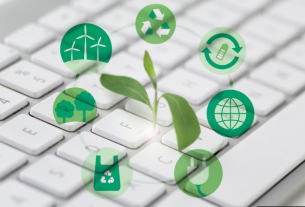The time for a sizable uptick in global sustainability is now. Thankfully, business partnerships can … [+]
In today’s business world, few things are more important than sustainability. In fact, an April 2022 survey found that nearly 80 percent of consumers in the United States consider sustainability in at least some of their purchasing decisions. A similar percentage of retailers also felt that their sustainability efforts have helped increase customer loyalty.
Of course, implementing sustainability practices is often easier said than done. Research published in the Harvard Business Review confirms that “the more that leaders try to operationalize sustainability, the more they find their organizations are ill equipped for the task — out of alignment and lacking essential skills and metrics. The problems are internal. The sustainability distress call is coming from inside the house.”
Lack of alignment, necessary skills and knowledge and even adequate KPIs can all disrupt global sustainability efforts. But as in so many other aspects of doing business, innovative partnerships can make a significant difference in driving global sustainability.
1. Shared Commitments for Sustainability
One of the best ways that a business can use partnerships to increase global sustainability is to evaluate both the partnerships it already has and new potential partners in terms of environmental impact.
One company that is having an impact going deep into its supply chain is McDonald’s. The company’s early wins in sustainability came from partnering with more sustainable packaging suppliers. As of 2021, 82.7 percent of McDonald’s primary packaging materials and 96.8 percent of its primary fiber packaging comes from recycled or certified sources. The golden arch’s goal is to use 100 percent certified, recycled or renewable materials by the end of 2025.
Notably, the Environmental Defense Fund reports that McDonald’s efforts in this area aren’t just good for the environment — they have saved the company an estimated $6 million per year.
This is far from the only way the fast food giant is prioritizing sustainability. In 2011, McDonald’s began tackling fish sustainability by collaborating with the Marine Stewardship Council (MSC) and existing suppliers to change fishing practices. In 2018, the MSC announced McDonald’s USA was the first and only global restaurant company to serve MSC certified fish at every U.S. location for over five years.
Now, the company is on a mission to reduce the controversial impact of beef farming on methane gas emissions, working with suppliers and industry partners such as the World Wildlife Fund to solve the tough challenges the beef industry is facing. These and other partnerships are having a very real impact for good in improving sustainability efforts.
2. Streamlining Sustainability Implementation
Of course, with many organizations struggling to implement sustainability practices, what is often needed is a partnership that makes it easier for them to become more environmentally-friendly in the first place.
One example of this comes from Chris Robinson, co-founder and president of Clearyst. As he explains, his company’s tech platform aims to help businesses succeed in their sustainability initiatives. “Successfully executing on a sustainability vision and understanding where to begin can be overwhelming, especially with your other responsibilities. Our goal as a partner is to help companies understand where they can quickly make material improvements in key ESG areas like employee wellness, energy savings and green IT policy. This puts the business on a fast track to more growth and greater sustainability impact.”
In this case, such partnerships provide the insights organizations need to fine-tune their environmental efforts. With quality data on their side, business leaders can focus sustainability initiatives appropriately to achieve the greatest impact — and ensure the success of their goals and programs.
As part of this, data processing also helps organizations track the effectiveness of their efforts. The ongoing ability to identify areas for improvement can enable businesses to continually update and enhance initiatives as needed.
3. Spreading the Word
Finally, strong sustainability-focused partnerships can help spread awareness among the general public of key environmental actions, spurring change at a broader level.
As David Bloch, Corporate Partnerships Director for WWF International (the World Wildlife Fund), explained in an article for CXO Mag, his organization was able to land new partnerships after Danish company Organic Basics ran a Black Friday campaign focused on promoting sustainable cotton farming, while also highlighting the harmful environmental impact of conventional cotton farming.
This marketing campaign came after the two organizations enjoyed a three-year partnership in support of regenerative cotton agriculture. As a result of the Black Friday ad campaign, WWF International was approached by several other textile companies about implementing similar projects with their own organizations.
In this case, the sustainability partners weren’t content to simply adopt such initiatives on their own and call it a day. They sought to educate consumers and others in the industry about the importance of their sustainability initiatives — and this in turn prompted others to reevaluate their behavior.
You don’t have to directly partner with every business in your niche to help foster greater global sustainability. The best businesses and their partners lead by example, and aren’t shy about promoting what they are doing.
With more and more customers evaluating a brand’s sustainability when making a buying decision, others in your niche will be driven to adopt similar initiatives when they see your example. Even if their reasoning is to avoid losing ground with customers, it still creates a net positive impact as more brands put sustainability first.
Many Partnerships Can Drive Sustainability
The exact nature of sustainability-focused partnerships may vary significantly — but they can all help your organization improve its impact on the planet.
Whether you’re working with eco-minded partners for supply chain and logistics, using experts to enhance your internal sustainability initiatives or raising consumer and industry awareness about relevant environmental issues, such partnerships can help change corporate and consumer behavior for the better. Every effort your business and its partners make to enhance sustainability will have a meaningful impact.

